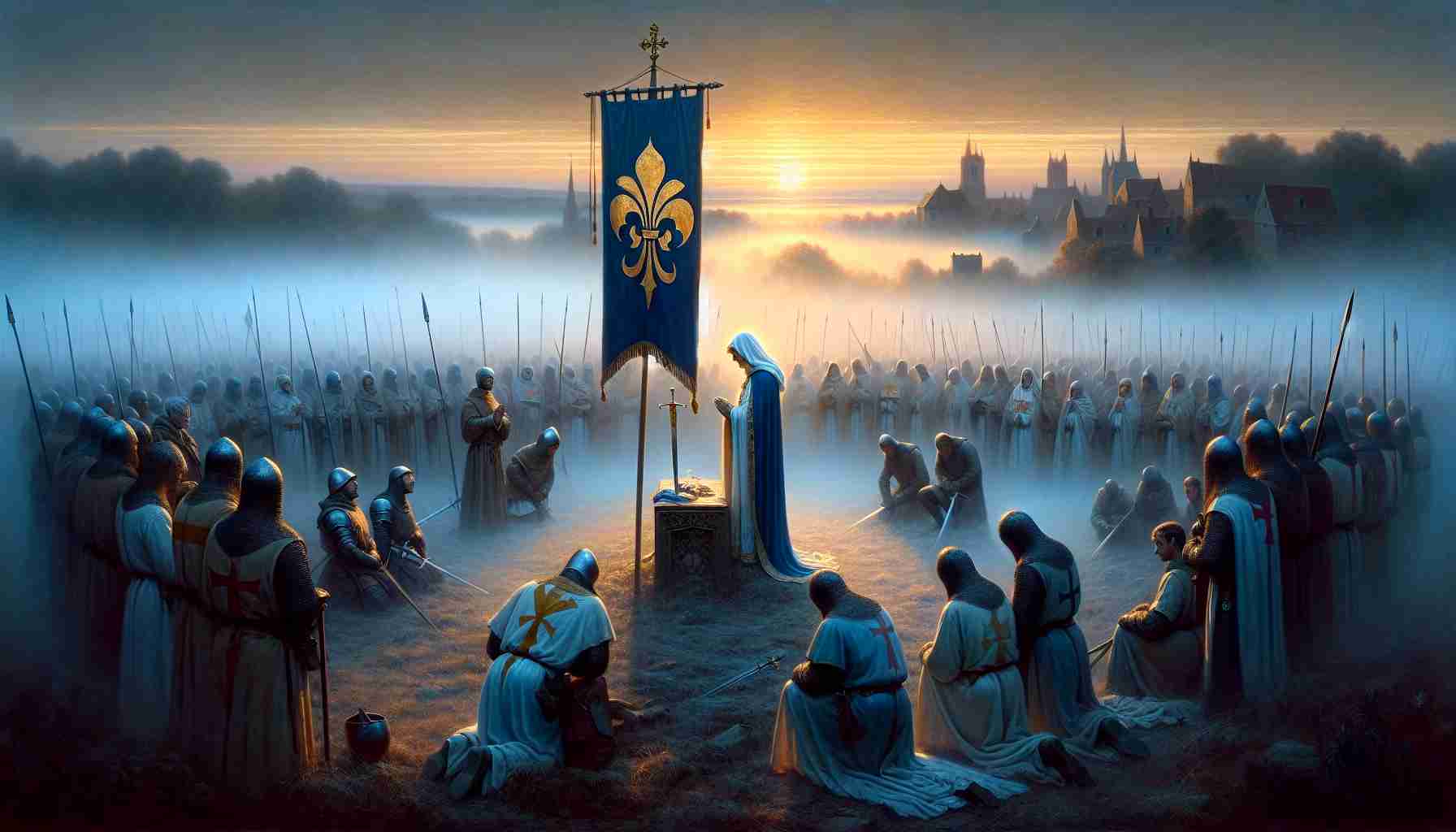

The bells of Saint-Denis rang before dawn, their iron throats calling warriors to arms. Fog clung to the low fields near Bouvines, a heavy shroud of silence broken only by the clink of mail and the breath of horses. Beside his standard, a gold fleur-de-lis on azure silk, King Philip II knelt in prayer, lips moving silently as priests read from the Psalms. “It was not by their sword that they won the land, nor did their arm bring them victory; it was your right hand, your arm, and the light of your face, for you loved them.” The verse floated like a benediction above the morning dew—Psalm 44:3, stitched into the king’s heart.
His army waited behind him—knights, yeomen, townsmen roused from crafts and vineyards. They faced an empire’s wrath: Otto IV of Germany, flanked by rebellious French vassals and bolstered by English gold. The price of resistance could be catastrophic. But none among Philip’s guard saw despair flicker in his eyes. Devotion pulsed in him like fire. France, he reminded his captains, was God’s work. To defend it faithfully was to serve heaven itself.
The sun rose, and so did the storm of war. Horses screamed. Steel met bone. The charge came swift across Saint Peter’s Bridge, where Otto’s cavalry sought to collapse the French flanks. Count Ferrand of Flanders, once Philip’s vassal, now thundered against his former king in treasonous fury. Chaos knotted the battlefield into a blur, banners tossed like sails in a tempest.
Philip led not from the rear but the fore. His sword sliced arcs through enemy breastplates, his armor heavy with the weight of destiny. Amid the tumult, his horse staggered, struck by an axe. The king fell. Around him, arrows rained. For a moment, silence dared to return—until the royal guard pressed forward, driving back the emperor's elite knights with cries of “Montjoie! Saint Denis!”
Historians would one day recount how Otto was unhorsed and fled beneath a borrowed standard, how Count Ferrand was captured struggling like an animal beneath the lash. Nearly six hours after the trumpet’s call, the field belonged to France.
But Bouvines was more than a victory. In the small, trembling hours after battle, as the king walked among broken spears and dying men, he ordered a mass held in the open field. Surviving priests raised the Host below fluttering pennants, giving thanks for a nation remade in a single day. Philip’s counselors, hardened by decades of diplomacy and war, wept as boys. For they saw not only battle won, but unity sealed.
In the years after Bouvines, peace reigned long enough for stone to rise where blood had fallen. With the spoils and renewed authority, King Philip poured treasure into Christendom’s spine—cathedrals. Vaults rose in Rheims and Bourges. Towers climbed above Chartres. And in Paris, the stones of Notre-Dame caught the morning sun as though touched by fire. These were not mere buildings—they were prayers in limestone, buttressed faith articulated in tracery and spire. The victory at Bouvines, whispered through the masons’ chants and sculptors’ touch, became immortal in glass and mortar.
Some in Rome murmured that Heaven had shown favor on Philip for strengthening the Church’s causes. In monastic libraries, scribes illuminated his face in gold leaf beside saints and apostles. The pope himself heaped praise upon the French crown, calling Philip "Defender of the Faith." The king, though stern and pragmatic in court, never failed to bow low before relics, nor did he forget the hollows of the battlefield.
Yet not all shadows faded. In England, King John, crushed by his support of Otto, faced rebellion and was forced to concede the Magna Carta. His nobles, citing the example of Philip’s loyalty to divine order, demanded liberty under law—a ripple from Bouvines crossing the Channel.
In Flanders, where Ferrand's standard had fallen into the mud, folk whispered of how a star fell from the sky at the hour of his capture. Some called it a sign of divine justice. Others feared it was prophecy undone.
But in France, the day of Bouvines marked a beginning. The idea that a realm could be Christian not only in rite but in purpose took root. That a throne, when aligned with God's will, could forge peace from chaos. The scarred fields became holy ground, walked in pilgrimage by the devout and the desperate. Local fathers buried their sons beneath simple wooden crosses and carved upon them not only names, but scripture. “For the Lord delights in those who fear him, who put their hope in his unfailing love.”
Centuries would pass. Kings would fall. Republics would rise. But the echo of Bouvines would never wholly die. It sang in the bells of Notre-Dame, tolled through Chalice and Crown, and haunted the hearts of men who dared to believe that trust in God's providence could shape nations.
Faith had crowned France that day. And under its golden light, an empire had found its soul.